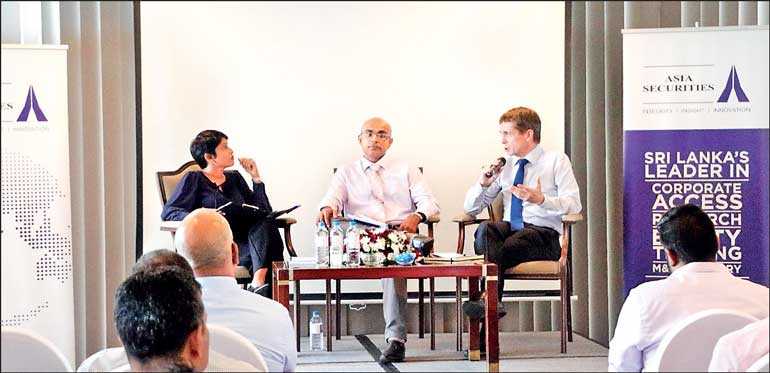Tuesday Feb 17, 2026
Tuesday Feb 17, 2026
Friday, 20 September 2019 00:00 - - {{hitsCtrl.values.hits}}

Consumer spending is a key barometer of underlying growth in an economy. Approximately 65% of Sri Lanka’s GDP growth can be accounted for consumer spending, and the security events in April led to a temporary setback in an otherwise robust year for consumer companies. However, the Consumer Confidence Index and Business Confidence Index published by Nielsen Sri Lanka have been improving. Coupled with better agriculture harvests, consumer demand should remain robust in 2019 and 2020, following two years of muted performance.
These were some high-level thoughts shared at the fourth instalment of InsideTrack investor event series hosted by Asia Securities on Tuesday, 10 September. Asia Securities, the leading investment services firm in Sri Lanka, hosted the event, titled ‘2020; Positioning for a Consumer Reboot’ focusing on the outlook for the Fast-Moving Consumer Goods (FMCG) sector. The event brought together prominent industry figures; Hemas Holdings PLC CEO Steven Enderby, with a sector knowledge expert, Nielsen Sri Lanka Associate Director – Consumer Insights Waruna Kathriarachchi.
As a prelude to the discussion, Asia Securities’ Consumer and Retail sector analyst, Mangalee Goonetilleke, presented the positive house view for the FMCG sector for 2020. She highlighted that despite the short-term setback to the sector from the April events, the fundamentals of the economy hold steady for a pickup in consumer spending in 2020. In addition, the recent Rs. 2,500 salary increase for government employees, stronger agriculture earnings, Samurdhi incentives and pension revisions will also aid higher spending.
However, due to subdued government revenues amidst lower tourism earnings, remittances and upcoming debt repayments in 2019, the government has limited room to provide substantial handouts through the 2020 budget. As a result, she noted that the spending revival in 2020 will pace slower compared to that in 2015/16.
The presentation was followed by a panel discussion with Enderby and Kathriarachchi.
Commenting on the overall FMCG industry, Kathriarachchi noted that the industry saw a pick-up in demand towards the latter part of 2018 and early 2019, coming off a slow period from the prior year. He noted that low inflation, slow currency depreciation and timely rainfall will be three key drivers for a FMCG sector demand recovery in 2020.
While the sentiment is not overly positive at this point, the improvement in Nielsen’s Business Confidence index and Consumer Confidence index, are encouraging. With approximately 25% of the working population exposed to agriculture, he confirmed that strong agriculture earnings will also aid a spending recovery going forward. While there are ongoing drought conditions in the country, it is less severe when compared to last year’s. Commenting on the personal care and home care categories, Enderby noted that the overall industry, including Hemas, experienced a slowdown after the April events, but highlighted that this is gradually improving. Consumers are still seeking value for money deals. However, he confirmed that better agriculture earnings and the increase in government salaries should fuel spending in 2020, albeit at a slower pace than experienced in 2015/16. He further discussed several initiatives that would drive business growth over the next few years for Hemas.